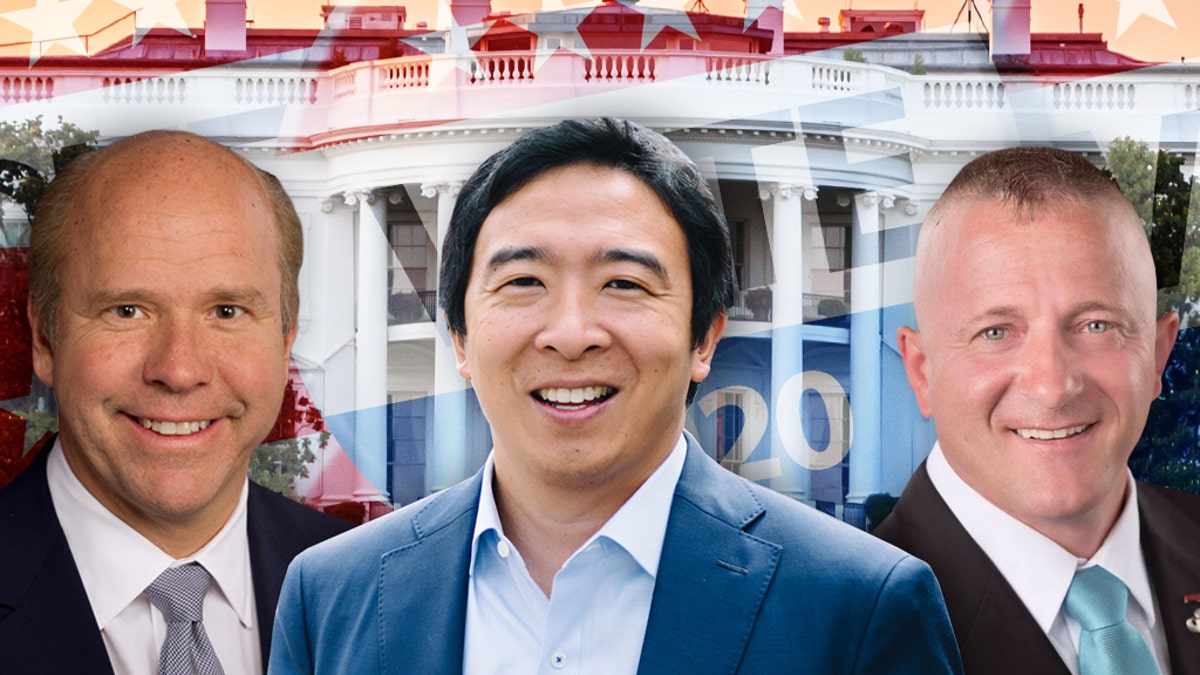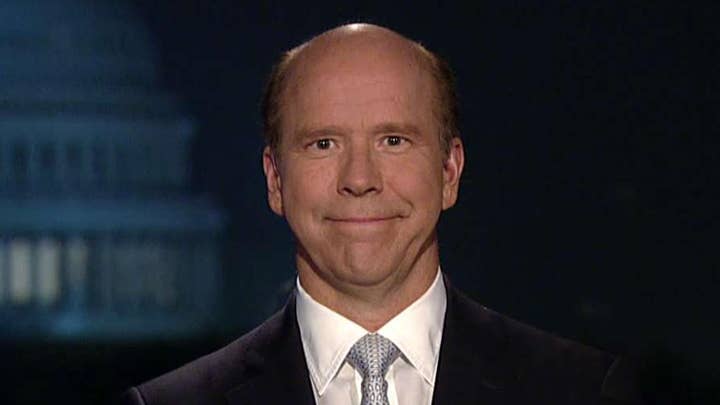
John Delaney, Andrew Yang and Richard Ojeda (from left to right) are among the longshot candidates seeking the Democratic presidential nomination in 2020.
CONCORD, N.H. -- John Delaney confidently claims his campaign’s trajectory is right on track.
“You’re probably going to laugh when I say this, but we’re exactly where we want to be,” the former Democratic congressman from Maryland and White House hopeful told Fox News, describing his longshot bid for president.
You might not have heard of John Delaney. He’s rarely mentioned in the same breath as recent 2020 entrants like Sens. Kamala Harris and Elizabeth Warren.
But Delaney declared his candidacy for the Democratic nomination way back in July of 2017, just six months into Donald Trump’s presidency. He’s one of a handful of candidates running well under the radar – a roster of longshots that includes even lesser-known names like Andrew Yang, Marianne Williamson and Richard Ojeda – in a cycle where even senators and governors are having a hard time breaking through.
KAMALA HARRIS ANNOUNCES 2020 BID
This takes money, staffing, time – so why do they do it? Each has their reasons. Delaney, for his part, maintains his message of uniting the country by finding common ground will resonate with primary voters.
“I have a feeling I’m going to run against a bunch of people who are going to divide the country,” he predicted. “I’m running a campaign based on the notion that we are all in this together.”
While Delaney has been in the background of the budding 2020 field since his historically early announcement, he told Fox News that timing was by design.
“Not enough people knew who I was when I decided to announce for president. Which is why I announced early. Because the way to solve that problem is to get in really early. This is my 13th trip to New Hampshire. I’ve done 21 to Iowa,” he explained during his latest stop in the Granite State.
'We’re exactly where we want to be.'
“My view is I had to basically run a pre-race to be in the race. And I did that and I listened to people ... and now I’m in the race,” he said.
Delaney touted that he has six offices with 24 staffers in Iowa – the state that kicks off the presidential primary and caucus calendar – and an office with four staffers in New Hampshire, the first-in-the-nation primary state.
Add that to his team of 20 at campaign headquarters and Delaney boasted that “pretty much by any measure, we’ve got the biggest operation right now. I expect us to run as robust a campaign as anybody else.”
Delaney had the field to himself for nearly a year-and-a-half -- but now the bigger names are jumping into the race. Harris just announced Monday, following similar announcements from Warren, Sen. Kirsten Gillibrand, D-N.Y., and others. On the sidelines loom heavyweights like former Vice President Joe Biden and Sen. Bernie Sanders, I-Vt.
Asked how he can compete, Delaney responded that “I think we’re going to have a very well-funded campaign.”
He can put his money where his mouth is. The 55-year-old Delaney was raised in northern New Jersey by working-class parents. But he found success as a banking entrepreneur and is worth nearly $90 million, which made him one of the wealthiest members of the U.S. House during his three terms in Congress.
As for facing off against rivals with national name recognition, Delaney argued that “name ID is something that you can build and we’re doing it.”
BIDEN TEARS INTO TRUMP AT MLK DAY BREAKFAST
But if the odds of a lower-tier candidate like Delaney winning the Democratic nomination – let alone the White House – are daunting, then Yang, Williamson and Ojeda are the longest of longshots.
While it’s easy to ignore these candidates, a leading New Hampshire-based political scientist cautioned that “whether it’s message, or it’s timing, or a combination of those two things, just having the right message at the right time, you never know if a candidate’s going to break through.”
That said, New England College political science professor and vice president of academic affairs Wayne Lesperance added that ego may be a driving force behind these candidacies.
“Anybody who runs has to have a healthy amount of ego. And they just simply believe that if they get in front of the crowd in New Hampshire or Iowa and tell their story, that people are going to be transformed by it,” Lesperance explained. “And so that healthy dose of ego can often fuel a person to run when the rest of us may be looking at it and saying ‘gee that’s an awful longshot.’”
Yang hasn’t been running for the White House for as long as Delaney, but he’s coming up on a year since he launched his campaign in February 2018. Like Delaney, he’s spending much of his time in the early voting states – and handing out money in those states to boot.
Yang, the CEO of the test-prep education company Manhattan GMAT before launching Venture for America (a New York-headquartered organization that trains entrepreneurs), is personally giving a family in each state $1,000 each month this year to illustrate his campaign pledge to pay what he calls a freedom dividend to all adult Americans.
The freedom dividend would pay $1,000 per month to every American over 18 years old, which Yang says would improve peoples’ lives and boost the economy. “The $12,000 would be universal. No questions asked. No means testing. So if you’re an adult between 18 and 64, you’re going to get it,” he explained.
He said he’d pay for the program by implementing a national value-added tax (VAT) of 10 percent, as well as by consolidating some welfare programs.
Asked about his longshot bid, the 44-year candidate spotlighted that in a recent poll, “one percent of Iowans had me as one of their top two choices. I was tied with Kirsten Gillibrand.” He confidently predicted that “you are going to see our numbers grow from here in Iowa and the same thing’s going to happen in New Hampshire.”
Williamson likely will soon join Delaney and Yang as a declared White House candidate.
“I started an exploratory campaign in mid-November to see what kind of support and interest there might be. And I received enough positive energy to make me feel I should take the next step,” she explained in an interview as she headed to New Hampshire earlier this month.
Williamson, 66, gained fame after her first book – ‘A Return to Love’ – became a best-seller and was featured on the “Oprah Winfrey Show” in 1992. She’s published 12 books, including four New York Times number one bestsellers. The activist and philanthropist, who ran unsuccessfully for Congress in 2014, is also a close friend and counselor to Winfrey.
Williamson, who will likely announce her candidacy next week, doesn’t feel like she’s competing against candidates with bigger names and bigger bank accounts.
“I don’t think of myself as running against anyone. I think of myself as running with everyone,” she argued. “I think it’s very healthy for our democracy and healthy for the Democratic Party that so many people will be weighing in with their ideas.”
CLICK HERE TO GET THE FOX NEWS APP
Richard Ojeda is another little-known candidate in a field dominated by big Washington names. The retired U.S. Army major and paratrooper who served in the West Virginia Senate quickly launched a campaign for the Democratic nomination days after losing a longshot bid for Congress in the heavily pro-Trump state.
Ojeda, who grabbed national attention last year for his vocal support of the West Virginia teachers’ strike, is running on a populist platform. The candidate, who voted for Donald Trump in 2016, has said in interviews that the Democratic Party had become “nothing more than elitist” and vows to fight for the working class.




